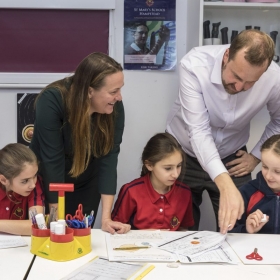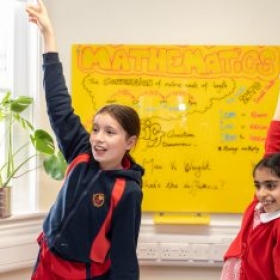Decoding The 11 Process With Martin Otter, Deputy Head – Academic
Published on isbi School News dated Tuesday 13th of December 2022
Mr Otter very generously granted the PTA a large chunk of his time to help unravel the mystery of the 11 process. Please find below an abridged version of this exclusive interview!The Basics – What is the 11 process?
It is very specific to the London independent day schools. Children apply to schools in the Autumn term of Year 6. The process involves a reference from their current school, a test, followed by an interview with prospective schools.
The Test
Unhelpfully, tests vary from school to school. Fourteen schools in the North/West of London got together to simplify the process. Instead of having several individual tests, they decided on a single Common Pre-Test for children applying to these 14 schools, thus forming the London 11 Consortium. Channing, Francis Holland (Regent’s Park), Francis Holland (Sloane Square), Godolphin and Latymer, More House, Northwood College for Girls, Notting Hill and Ealing High School, Queen’s College, Queen’s Gate, South Hampstead, St Augustine’s Priory, St Helen’s, St James Senior Girl’s School and St Margaret’s are all part of the Consortium.
Schools outside of this (North London Collegiate, St Paul’s, City of London etc) still have their own tests, so children applying to these may end up sitting three or four different tests.
Approximately 90% of St Mary’s applications are for the Consortium. Year 6 has an online assessment around Christmas time following which schools select a group of children to attend the interviews.
Test or Interview? What do schools weigh more?
The consortium says a third, a third, a third, with the test, interview and reference being equally important.
The Reference
The reference from St Mary’s is based on a common form which parents fill out with the support of the staff. Harriet and I are responsible for writing the references alongside the form teachers. To that end, I spend a lot of time in the classrooms. I have personally taught all year groups from Reception through to Year 6 and so am well acquainted with the children and the progress they have made as they come through.
The form is approximately four pages of information and covers everything the child has done over the last three or four years, inside and outside school. Their hobbies, interests, achievements, responsibilities, charity work, sports and any other extra-curricular activity all go on the reference.
It serves to take the pressure off to some extent, particularly if the child has a one-off bad day on a test or interview.
When does the school start preparing the children for the process?
The informal preparation, without the child even knowing it, starts in Year 3. Structured reasoning lessons are introduced through games, books, practising on Atom etc. It is just about exposure at this stage and the load is quite light. It ramps up progressively with Year 4s having three half an hour slots per week to Years 5 & 6 having longer sessions more focussed on practising prior papers, doing more testing and having more specific work sent home. It is deliberately gradual so that the children do not feel stressed and pressurised.
I have worked in schools that start the process middle of Year 5 and in my experience that is just not enough time. The best approach is the one we follow at St Mary’s – start early and very slowly so that children are organically eased into the process. It then comes naturally to them and they don’t even need to prep for test week.
What parameters determine the recommendations of prospective schools for individual students?
Personality plays a big part in this and therefore the relationship between the teaching staff and the pupils is of paramount importance. For example, an academically high-achieving child with a sensitive personality may scrape through the St Paul’s assessment, but may not be able to keep up with the constant high level of expectations and demands at a school like that. They may do much better at a school which is academically selective, but with a stronger pastoral focus. Really knowing the cohort can facilitate communication between the school and parents when making key recommendations in the best interest of the pupils.
How well networked are you with senior leadership teams at the schools in the area?
Harriet and I have strong relationships with all of the schools to which we send girls. We attend events like Head’s breakfasts, talks where the Heads speak about the latest developments and what they are looking for. The events are usually very informal which helps quickly build the link between schools and ensures we know a school’s ethos, values and visions.
Advice to parents?
I would say Year 6 is the first time you need to get really serious about the process. We have our first chats with you in Year 5. We spend half an hour with each parent, one-to-one, and have a really open, honest discussion about where your children are in terms of the data, so that you know where they sit roughly with regard to different schools. You get a letter off the back of that with the list of schools we have discussed. You could start developing an understanding of those schools and start visiting them in a low stake capacity. Year 6 is when you really need to start thinking about it, and applications don’t need to be in till about the middle of October through to November. So really that’s your deadline, stress before then is only going to rub off on the children.
Thank you so much Mr Otter!



